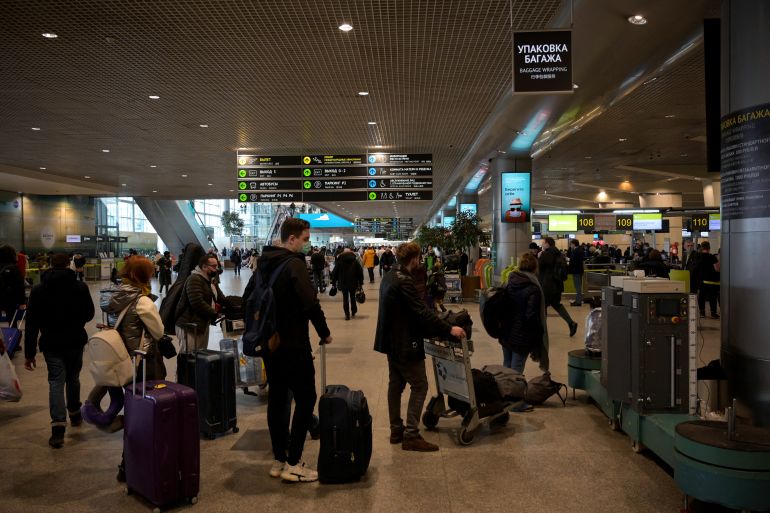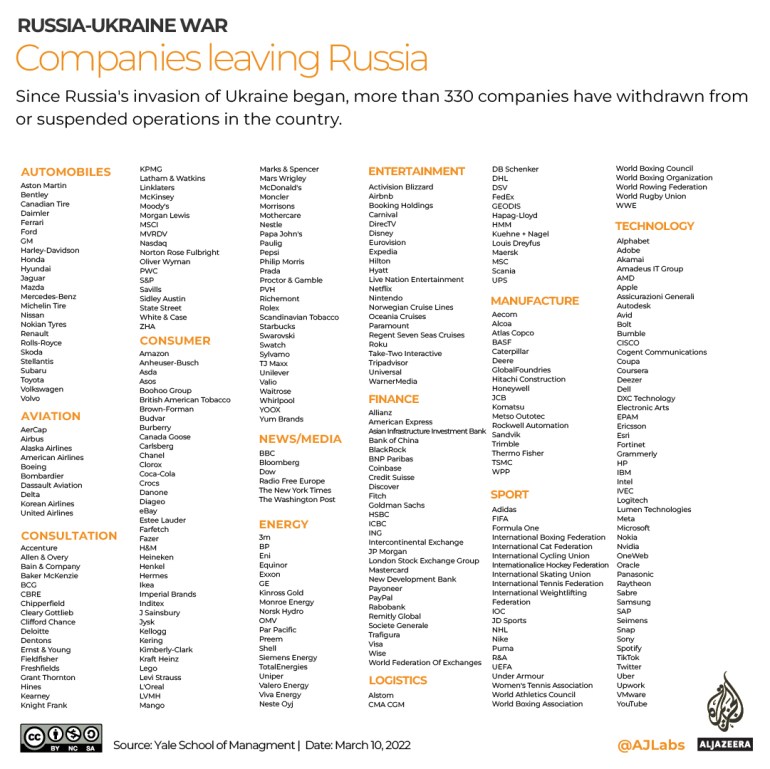Fearing conscription, anti-war Russians flock to Uzbekistan
For years, Uzbeks travelled to Russia in search of better lives. With the Ukraine conflict, the trend is in reverse.

When Ali, a Russian citizen, left Moscow on March 5, his friends said their goodbyes at a metro platform.
A few hours later, he landed in Uzbekistan’s ancient city of Bukhara, a place he had never considered visiting.
Keep reading
list of 4 items‘He will die’: Russia-Ukraine war’s unseen medical horrors
For Syrian survivors, Russia’s tactics in Ukraine eerily similar
‘They are so young’: Corpses pile up in Mykolaiv morgue
“I left when I heard rumours about the introduction of martial law in Russia and the closure of the borders. I took the cheapest ticket and it happened to be Bukhara,” said Ali, 29, who requested Al Jazeera withhold his last name, out of fears of being identified and punished.
“Any person who knows history and who has a heart cannot agree with what is happening in Ukraine. We understand what a crime it is in the 21st century to attack a country that did not plan to attack you,” he said over the phone.
“The vast majority of our citizens are in favour of the war, they all believe that there are Nazis or criminals in Ukraine. We have been facing a total backlash on freedom and all of this will turn into an economic and humanitarian disaster soon.”
Ali is one of the thousands of Russian citizens who over the past few weeks have decided to leave their homeland because of the war against Ukraine.
About 25,000 moved to Georgia, while others fled to Armenia, Turkey or Nordic states such as Finland.
Georgians, however, are reportedly unhappy with the influx of people from Russia – Moscow invaded their country in 2008. Russians have spoken of widespread Russophobia and difficulties in finding apartments and starting over.
It is unclear how many people have chosen Uzbekistan. But, according to locals, thousands of Russians have appeared on the streets of the capital Tashkent in recent weeks, as well as in smaller cities.
According to volunteers, most new Russian arrivals are high-quality specialists or part of a liberal creative class, cadres Uzbekistan has largely lacked.
Over the years, the conservative Central Asian country has seen a regular outflow of educated youth, mainly to Moscow.
“The majority of the newcomers are against Russia’s politics, as far as I can tell. People don’t want to take part in this war. They try to escape conscription and want a more comfortable, peaceful life,” said Sabina Suleymanoglu, a producer with 139 Documentary Centre, a cultural hub in Tashkent, who is among those supporting newcomers.
“The war was not of their choosing, this is not their war.”
Escaping conscription was why Jonibek, a 29-year-old HR manager from Moscow, left Russia.
An ethnic Uzbek, he booked his tickets on February 27, three days after the war began.
He packed a few essentials – a laptop, two phones and some clothes. He left behind his parents and a brand new apartment.
“I follow Ukrainian telegram channels and I saw that our army is not winning, which means that general mobilisation will take place soon. It is better to leave now than to regret later,” Jonibek told Al Jazeera over the phone.
He did not give his second name, fearing that his family in Moscow may face reprisals.
“Dying for inexplicable principles is stupid. I understand that Ukrainians are dying for their homeland, but us? I have no regrets, I see where the whole economy is heading, there will soon be no demand, there will be a devaluation of the rouble and everything will collapse.”
Jonibek is now staying with his grandmother in Samarkand and will soon head to Tashkent. He does not know whether he will stay in Uzbekistan but wants to give it a chance.
“Russia has no future, it will soon fall apart without specialists and foreign companies,” he said.
But his rage is not only directed against Russia.
“We have a lot of questions for the West in regard to sanctions. Now this tyrant has begun to fight another country and we are suffering. It’s too bad that all our accounts are blocked and we can’t withdraw money to leave or survive abroad,” said Jonibek, referring to Russian President Vladimir Putin.
“I am lucky because I can live here in a quiet place for free, but only yesterday my friend was beaten at the police station in Moscow because she took part in a rally. She wants to leave but she cannot, she has no money and no savings.”
According to observers, corruption and an authoritarian system stalled Uzbekistan’s development for years.
But since Shavkat Mirziyoyev came to power as president in 2016, the country has seen some positive economic reforms.
Now, some in Uzbekistan hope that the presence of thousands of specialists from Russia will have a positive effect on the economy and creative industries.
Volunteers have created online networks to help Russians relocate and settle in – and connect them with companies that are recruiting.
“Some people want to stay here. They have started making contacts and looking for job offers. I’ve met some designers today and introduced them to a local production company. There is a lot of networking going on,” said Suleymanoglu.
“Restaurants are full of foreigners these days, so I think that the service sector will enjoy a boom and the economy will grow. There are a lot of well-educated, interesting people: artists, designers, IT people. They are all liberal and open-minded.”
An unanswered question, however, is how Uzbekistan’s government will respond to a mass influx of hip Muscovites.
On the one hand, the country needs specialists, but on the other, the crowd might not be to the taste of Uzbek authorities.
One individual targeted by the Western sanctions list is Alisher Usmanov, Putin’s close associate and an ethnic Uzbek with ties to Uzbekistan’s government. A son-in-law of Mirziyoyev works in one of Usmanov’s companies.
Meanwhile, local media expressing pro-Ukrainian sympathies have reportedly been asked to write in a more neutral manner while Tashkent-based Imam Abror Mukhtor Ali, who works in the government-sponsored Centre for Islamic Civilisation, recently stated that if Putin fails in Ukraine, the West will invade Central Asia.
So far, it is unclear how many Russians will decide to stay in Uzbekistan. But despite the circumstances, the atmosphere in Tashkent is that of hope.
“I’m proud of people in Tashkent,” said Suleymanoglu. “Some of the locals don’t share the newcomers’ liberal views but are happy that they are coming. This is a typical Uzbek reaction to guests, we are always glad when people come here.”
